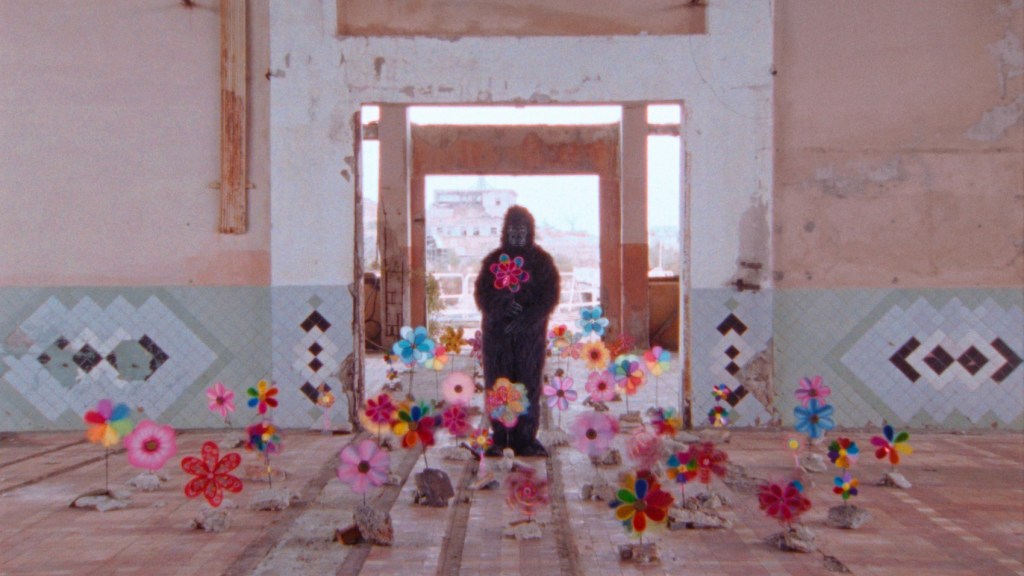If, as they say, the first casualty of war is innocence, then this harrowing memoir from director Vladlena Sandu is the proof. Born in Crimea in the early ’80s and sent to live with her grandparents in Grozny (then Chechnya), Sandu has had some pretty bad luck in her time, to put it mildly. This hypnotic prose poem, taken from those real-life experiences, is not just an attempt to make peace with the trauma she experienced in those years but a warning about the helter-skelter of death that happens wherever and whenever war breaks out. As she says in her opening statement, “This film serves as an act of acknowledging my past and an attempt to comprehend the cycle of violence spanning generations.”
As she says this, Sandu is seen holding the head of a gorilla suit, which might seem strange at first but comes to represent the director’s affinity with the famously persecuted screen legend King Kong. Why a little girl would even be watching a film made in 1933 when children her age in the west were likely watching The Little Mermaid is a story in itself, but then the rest of her life seems to come from a time before the dawn of the 20th century. Sent away by her actress mother at the age of seven, Sandu grows up in the twilight of the U.S.S.R., and while living in poverty she can only bear mute witness as the new Russia is birthed in blood.
The years pass by with fragments of reminiscences, all of which are indelibly inked on the young girl’s mind, like the schoolteacher who taught her that the three most important words in life were “mother, motherland and Lenin”. She recalls her grandfather’s cruelty, his drunkenness, and his allegiance to the Communist Party. For a time, Sandu simply lets these things stand by themselves as a kind of tattered cobweb of reminiscences, but as she gets older, the world outside starts to reveal itself. Like the time a production of the ballet Swan Lake seemed to be on the TV all the time; under that cover, meanwhile, the country’s perestroika leader Mikhail Gorbachev had been swapped out for Boris Yeltsin.
This deliberation conflation of an inner and outer life is about to prove very effective; as the younger Sandu becomes a teenager, the director begins filling in some of her family’s perspective, and the most striking element of this is her rising compassion for her grandfather, whose backstory mirrors and proves even more disturbing than her own. There’s also the grim irony in the fact that when the young Sandu has a respite from the war in Chechnya, she is sent by a relief program to her birthplace in Crimea, where the citizens are blissfully unaware that there’s a war going on in Grozny at all, a state of affairs that would soon be just as brutally shattered as it was in Grozny. There, she reconnects with her estranged father, only to find that — to cap it all — he is now a fugitive, a wanted heroin dealer.
Sandu puts everything she has on the screen, including herself, using brutal images that, though shocking, can’t rival the horrific reality of all the things she saw and felt in that key ten-year passage of her life. Most surreally, she uses dolls and puppets to represent some of the bloodier moments, a decision perhaps best explained in a line from Bob Dylan’s protest song “Masters of War”, which she judiciously deploys at the end (“You play with my world like it’s your little toy,” he spits). Unusually, Memory front-loads its credits, a choice that makes its powerful ending all the more shattering; over images drawn from warzones all over the globe, Sandu makes the sobering assertion that her shocking story is just one of many: Children are, and have always been, just collateral in the self-perpetuating history of man’s inhumanity to man.
Title: Memory
Festival: Venice (Giornate Degli Autori, Opening Film)
Director/screenwriter: Vladlena Sandu
Cast: Amina Taisumova, Selima Agamirzaeva, Vladlena Sandu
Sales agent: Loco Films
Running time: 1 hr 38 mins

